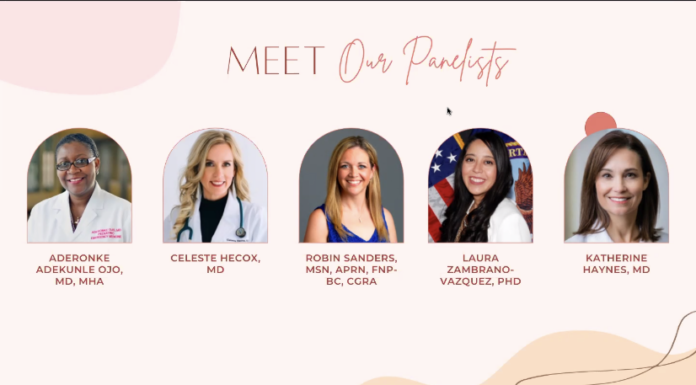
By Mariah Bennett | Staff Writer
Baylor’s American Medical Women Association hosted its annual Wonder Women Panel from 7 p.m. to 8:10 p.m. Thursday on Zoom. The event featured five women in multiple pre-health professions who discussed their experiences, challenges and overall advice for students.
Daniela Zirkle — San Diego, Calif., senior and AMWA president — said the panel was called “Wonder Women” for multiple reasons, including AMWA’s focus on female empowerment in medicine and the challenges women face on their journeys to pre-health careers.
“Having this event allows our members to see mentors and role models who are in the roles they aspire to be in,” Zirkle said.
Zirkle said she regards the panelists as wonder women because of their work-life balance.
“The panelists do it all: they have families, awesome careers and kids, and they make it work,” Zirkle said. “They’re given the same 24 hours in a day we are. I think that’s pretty super.”
The panel lineup included Dr. Aderonke Adekunle Ojo, Dr. Laura Zambrano-Vazquez, nurse practitioner MSN Robin Sanders, Dr. Celeste Hecox and Dr. Katherine Haynes.
The event began with a short introduction of the panelists, which was followed by three prepared questions and a short Q&A. There were 70 attendees, including the hosts and panelists.
The first prepared question asked panelists to describe their jobs and what they enjoyed the most about them. The panelists are involved in multiple pre-health professions, including clinical psychology, pediatrics and gynecology.
Haynes, who earned her undergraduate degree at Baylor, has her own practice with a focus on gynecology and minimally invasive gynecologic surgery. Haynes said she enjoys the surgical aspect of her job as well as developing long-term relationships with her patients.
“You’re able to help people and see them progressively get better over time,” Haynes said. “They’re very thankful usually. My relationships with my patients are typically relatively long-term.”
The second prepared question asked panelists why they decided to enter the field of healthcare. Ojo, who originally aspired to be a teacher, said her decision was based on a dare from her mother.
“My mom said, ‘Whatever you do, don’t do medicine,’” Ojo said. “That was a dare, and the rest was history.”
Ojo said her mother felt that her brother — who was also in medical school — was having a hard time and that because he was a boy and she was a girl, she would have an even worse time.
Ojo said she promised her mother that she would become valedictorian of her medical school class, and she kept her promise. She is currently an associate professor of pediatrics, an attending physician at the Texas Children’s Hospital and a senate representative for the department of pediatrics. She is also the mother of two Baylor students.
The final prepared question asked panelists if they had experienced challenges and obstacles in their healthcare and/or clinical research due to their gender.
Hecox said she is currently a private pediatrician with Baylor Scott & White Hillcrest Pediatrics. Hecox said that while the climate is getting better, even to this day she wears her long white coat and heels in the hospital in order to get people’s attention that she is the person directing their care.
“A lot of times, people’s assumptions will preclude that as a possibility,” Hecox said. “They don’t pay attention to what we’re talking about because they think somebody else will be coming in after. You have to really try to be heard and seen as a female.”
After the Q&A, the event closed with a general piece of advice from Zambrano-Vazquez, who encouraged students to take their time. This advice was supported by Ojo, who added that students should enjoy their journey and make sure they want to pursue their profession.
“Find your peace, take your time and work toward finding mentors, friends and colleagues who will help support you through the journey,” Zambrano-Vazquez said. “Take care of yourself.”




